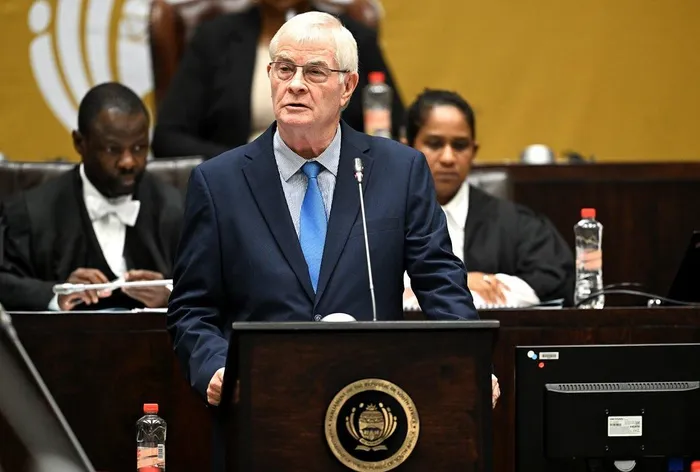Bring back the cane? Groenewald sparks debate with corporal punishment call

Correctional Services Minister Pieter Groenewald stresses protecting vulnerable communities, especially women and children, by tightening parole approvals and urges honest dialogue on crime solutions, including revisiting corporal punishment despite its ban since 1996.
Image: GCIS
Correctional Services Minister Pieter Groenewald has put forward the suggestion of corporal punishment to be reintroduced as part of the national debate on crime and justice reform in South Africa.
Speaking during his budget vote debate in Parliament on Tuesday, Groenewald laid bare the depth of the crisis facing the Department of Correctional Services (DCS), pointing to overcrowded prisons, deteriorating infrastructure, and a strained parole system.
Groenewald turned to a controversial but deliberate proposal: the reinstatement of corporal punishment.
“We must start a debate to say, shouldn’t we bring back corporal punishment?” he said.
Groenewald's proposal comes despite corporal punishment having been outlawed in South African schools since 1996, with subsequent legal rulings extending the ban to the home.
Groenewald tied this call to broader concerns about the effectiveness of the criminal justice system, especially about violent crime and gender-based violence. He highlighted the need for honest conversation around crime deterrence, particularly given the limitations of the current correctional model.
Groenewald described a prison system under intense strain, housing over 104,000 sentenced offenders with facilities designed for 108,000 inmates, and an additional 60,000 remand detainees, many of whom are in jail simply because they cannot afford bail.
In support of alternatives to remand detention, Groenewald said he endorsed a bail fund proposal from the inspecting judge, aimed at assisting detainees held for minor offences with bail under R1,000.
He also highlighted that the growing number of inmates includes a sharp increase in foreign nationals, which adds another layer of financial strain on the Department. This, combined with inflation and rising food costs, has made it more difficult to meet nutritional needs within correctional facilities.
“The escalating cost of food is fuelled by inflation, and the growing number of inmates, including a sharp increase in foreign nationals, adds another layer of financial strain,” Groenewald said.
The parole system was also a major focus of the minister's speech. Groenewald, who holds the final authority on parole for inmates serving life sentences, revealed that out of 1,079 lifer parole profiles reviewed, only 29 parole applications and 3 cases of day parole were approved. He highlighted his strict stance on releasing potentially dangerous offenders.
“When I receive a psychological report or a criminalist report, and the risk of re-offending is medium to high, I will not approve any parole for that specific case,” he said.
Groenewald further cited alarming incidents where parolees reoffended, particularly in cases involving rape, and reaffirmed the department's responsibility to protect vulnerable groups,especially women and children.
“When parole becomes a loophole for further terror and criminality, it is not merely a policy failure, it is a failure of justice,” he said
The minister framed his proposal on corporal punishment not as a settled policy, but as a necessary and urgent debate in light of a justice system under pressure from rising crime, limited resources, and systemic inefficiencies.
Groenewald also signaled a broader philosophical stance on dealing with crime.
“My philosophy is always that you can only properly deal with a problem if you put the real facts on the table and not in a state of denial.”
hope.ntanzi@iol.co.za
Get your news on the go, click here to join the IOL News WhatsApp channel
IOL Politics